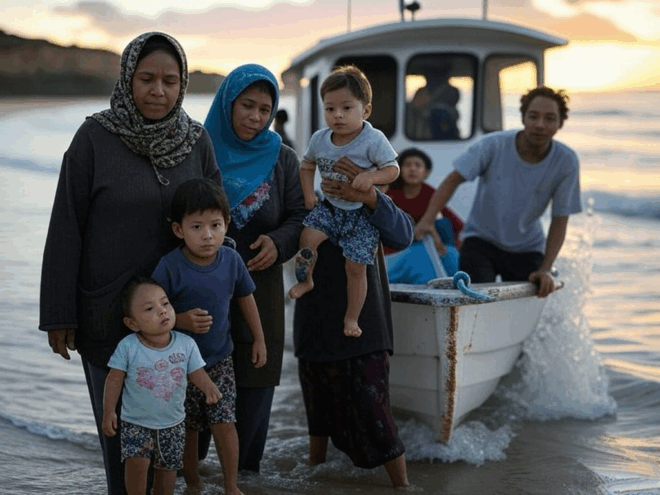
Introduction
Border security remains a polarising issue in Australian politics, often emerging as a focal point during federal elections. Politicians leverage this sensitive topic to rally voters, install fear, and question the effectiveness of the ruling government. The Australian public’s apprehension towards unauthorised maritime arrivals, often termed “boat people,” is rooted in years of policy debates, media portrayal, and political rhetoric centered on national sovereignty and security.
In the 2022 federal election, then Prime Minister Scott Morrison made waves by announcing the interception of an asylum seeker boat on election day, a strategy later revealed to be a calculated political manoeuvre aimed at swaying voter sentiment. This incident raised serious concerns regarding the authenticity and motives behind such announcements, especially since no boats were confirmed to have arrived that day. Fast forward to the 2025 federal election, and we witness a similar narrative unfold: just a week before polling day on May 3, reports emerged of alleged unauthorised boat arrivals on a remote beach in northern Australia. Opposition Leader Peter Dutton seized the opportunity to criticise Prime Minister Anthony Albanese’s leadership, despite the lack of confirmation from the Australian Border Force (ABF) or the government. This post delves into the parallels between these two events, exploring their political motivations, media dynamics, and broader implications for Australian democracy.
Historical Context: Border Security as a Political Weapon
Australia’s approach to border security, particularly through Operation Sovereign Borders (OSB), has been a significant element of political discourse since the early 2000s. Introduced in 2013 under the Abbott-led Coalition government, OSB aimed to “stop the boats” through measures such as offshore processing, boat turn-backs, and enhanced maritime surveillance. Framed as a crucial step to deter people smugglers and safeguard national security, this policy resonated with voters anxious about unregulated migration.
The politicisation of boat arrivals gained traction during the 2001 federal election when the Howard government utilised the Tampa affair – a Norwegian freighter carrying rescued asylum seekers denied entry to Australia – to assert a strong border protection stance. This incident, coupled with the infamous “children overboard” scandal, solidified border security as a wedge issue. These events established a blueprint for exploiting border incidents to sway public opinion, particularly among conservative voters.
The 2022 Election: Morrison’s Election-Day Gambit
On May 21, 2022, as Australians flocked to the polls, Scott Morrison, then-Prime Minister and Liberal Party leader, directed the ABF to issue a public statement regarding an intercepted asylum seeker boat. This announcement was unprecedented, as OSB typically operates under strict confidentiality to prevent alerting people smugglers. The Liberal Party promptly capitalised on the news, framing it as evidence of Labor’s perceived weakness on border security. However, investigations later revealed that no boat had arrived that day, and the announcement was a calculated directive from Morrison’s office aimed at gaining political advantage.
Critics condemned this maneuver as a cynical attempt to manipulate voters. Political analysts noted that the announcement aligned perfectly with the Coalition’s campaign narrative, which emphasised Labor’s historical challenges with border policy during the Rudd-Gillard years. Despite the controversy, the tactic did not secure a victory for the Coalition, as Labor, led by Anthony Albanese, emerged with a narrow majority. This incident highlighted the risks associated with utilising unverified or exaggerated claims about border security, damaging the Coalition’s credibility and fueling accusations of fearmongering.
The 2025 Election: Echoes of 2022
As the 2025 federal election approaches, a strikingly similar narrative has surfaced. On April 26, 2025, reports emerged of an alleged unauthorised boat arrival on a remote northern Australian beach, initially reported by 7 News and based on a Facebook post by a commercial helicopter pilot. The report claimed that five men were found on the beach, prompting a response from the Border Force. Opposition Leader Peter Dutton and the Coalition quickly seized on these reports, with campaign spokesman Senator James Paterson describing the incident as “deeply concerning” and accusing the Albanese government of failing to secure Australia’s borders.
However, no official confirmation from the ABF or the Albanese government has been forthcoming, leading to speculation that the reports may be exaggerated or fabricated. Social media users have labeled the story a “hoax,” suggesting it may be a political tactic designed to benefit the Coalition. The timing of this incident, occurring just a week before polling day, mirrors the 2022 election-day announcement, suggesting a deliberate strategy to influence voter perception at a critical moment. Dutton’s aggressive rhetoric and calls for accountability align with the Coalition’s broader campaign narrative, portraying Labor as weak on national security.
Political Motivations and Beneficiaries
The primary beneficiary of unverified boat arrival stories during election campaigns has historically been the Coalition, which positions itself as the stronger party on border security. The Liberal-National Coalition stands to gain from these narratives in several ways:
1. Voter Mobilisation: Border security resonates strongly with conservative voters, particularly in marginal electorates. By amplifying fears of uncontrolled migration, the Coalition seeks to galvanise its base and sway undecided voters concerned about national security.
2. Wedge Politics: The issue creates a wedge between Labor and its progressive base. Labor’s commitment to maintaining OSB often clashes with its left-leaning supporters who advocate for more humane asylum policies. By forcing Labor to defend its border security credentials, the Coalition aims to expose internal divisions and potentially benefit minor parties like the Greens.
3. Distraction from Policy Weaknesses: The Coalition’s campaign has faced scrutiny over various policy missteps. By raising the issue of boat arrivals, the Coalition diverts attention from these vulnerabilities and shifts the narrative onto Labor’s perceived failures.
4. Media Amplification: The media plays a crucial role in amplifying unverified reports. In 2025, the initial story, originating from a social media post, gained traction despite lacking official confirmation. This reflects a broader trend where sensational border security stories receive disproportionate coverage, shaping public perception and pressuring the government to respond.
Media Dynamics and Public Perception
The media’s influence in shaping the narrative surrounding boat arrivals is significant. In both 2022 and 2025, initial reports were based on limited or unverified sources, creating a sense of urgency and crisis even in the absence of concrete evidence. The Coalition’s swift response ensures that the narrative gains momentum before the government can clarify or debunk it.
Public perception is heavily influenced by these dynamics. Polls indicate that border security remains a pressing concern for many Australians, particularly in regional areas. The Coalition’s repeated framing of Labor as “weak” on borders taps into existing anxieties about national sovereignty and safety. However, the lack of confirmation in 2025 risks backfiring, as public skepticism grows, particularly in light of the 2022 incident, which damaged the Coalition’s credibility.
Implications for Australian Democracy
The strategic use of unverified boat arrival stories during election campaigns has profound implications for Australian democracy:
1. Erosion of Trust: The repeated use of fear-based tactics undermines public trust in political institutions and the media. The 2022 incident strained the Coalition’s credibility, and a similar outcome in 2025 could further erode voter confidence.
2. Distraction from Substantive Issues: The focus on boat arrivals overshadows critical policy debates, such as cost-of-living pressures and climate change. By prioritising sensationalism, both parties risk neglecting the issues that directly impact Australians’ lives.
3. Polarisation and Division: Border security narratives exacerbate social and political divisions, framing asylum seekers as threats rather than humanitarian concerns. This polarisation complicates efforts to pursue balanced, evidence-based policies on migration and asylum.
4. Impact on Asylum Seekers: The denomination of boat arrivals perpetuates negative stereotypes and dehumanises vulnerable individuals, underscoring the human cost of Australia’s deterrence-focused policies.
Counterarguments and Labor’s Response
Labor has sought to counter the Coalition’s narrative by emphasising its commitment to OSB and increased border security funding. In early 2024, Albanese highlighted a significant boost in ABF spending, rejecting Dutton’s claims of weakened borders. The government’s refusal to confirm the 2025 boat arrival story may be a strategic choice to avoid legitimising unverified claims and to prevent exploitation by people smugglers.
However, Labor’s defensive stance risks reinforcing the Coalition’s framing, as it struggles to shift the narrative to its strengths. Albanese’s campaign has focused on stability and cost-of-living relief, but the boat arrival controversy threatens to derail this messaging, particularly in marginal seats where border security resonates.
Conclusion
The 2022 and 2025 boat arrival controversies reveal a troubling pattern in Australian politics: the strategic use of unverified border security narratives to influence election outcomes. In both instances, the Coalition has been the primary beneficiary, leveraging these stories to mobilise voters and distract from policy weaknesses. However, the lack of confirmation in 2025, combined with public memory of the 2022 incident, suggests that such tactics may have diminishing returns.
These incidents underscore broader challenges for Australian democracy, including the erosion of trust, the sidelining of substantive issues, and the perpetuation of divisive narratives. Moving forward, political leaders must prioritise evidence-based policy discussions and resist the temptation to exploit fear for electoral gain. As Australia approaches polling day, the question remains: will fear-based politicking prevail, or will the electorate demand a more constructive path forward?


